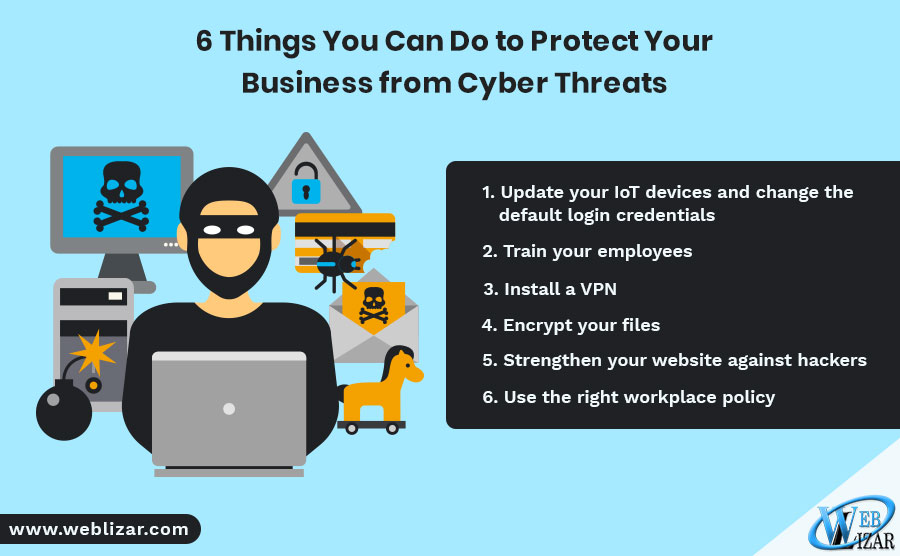6 Things You Can Do to Protect Your Business from Cyber Threats

Conducting any business without having a presence in the online world is next to impossible. Digital transformation is the name of the game, and cyber-security goes right along with it. Neglect it, and your company’s sensitive data may find itself in the hands of hackers. And they can do all sorts of mischief with it.
Since cyber-security is such a broad topic, it’s easy to get lost in the dark, not knowing where to begin. To address the issue, here comes a list of the top 6 things you can do to stay safe.
1. Update your IoT devices and change the default login credentials
Lot devices play an essential role in your business. Controlling the sensors, supply management, monitoring the livestock – you name it. If you don’t keep them up to date, they’re one of the major risks to the security of your network.
Too many business owners don’t bother changing the default login credentials. And that allows hackers to get in without doing any real hacking at all. So go through every piece, make adjustments where needed, and run the update procedure every once in a while.
2. Train your employees
The technological aspects of cyber-security are one thing. But did you know there’s also a psychological side to it? That’s right – we’re talking about the human factor. Without the proper training, your employees can fall prey to phishing emails. And those tend to trick employees into handing over sensitive company details, including login information.
Some signs will help you recognize phishing, such as looking at the address in the URL bar of your browser. Deciding against clicking on any links that get sent through an email is a good rule of thumb too. Of course, there are other ways to practice cyber-security. Frequent password changes are one of the things you can enforce.
3. Install a VPN
Remote working has become the preference of the modern workforce, particularly among the millennial’s. What’s better than waking up and getting the job done from the comfort of your home? You could be wearing nothing but your underwear and – as long as the task gets finished – no one would care. But if you transfer any sensitive work-related files from a public Wi-Fi network, you’re subjecting yourself (and the company) to the risk of having them intercepted. That’s why VPN is an excellent addition to your cyber-security arsenal. Not only does it encrypt your file transfers, but it also hides your IP from those who have no business knowing it.
4. Encrypt your files
Advanced file encryption solutions like Nordlocker help you to keep your files safe and private. And that should be of utter importance to you. If you store the payment details of your customers, document scans, or similar data, it would cost you millions in damages in case of a data breach. Did you know that with the right tools and knowledge it’s easy to bypass the login screen of your operating system? It takes one forgetful moment of leaving your computer unattended, and an unauthorized individual could be browsing through its contents. But if you’ve encrypted your files on a case-per-case basis, there is no reason for concern.
5. Strengthen your website against hackers
Ever wondered what hit your reputation would suffer in case your website gets breached by hackers? They could play around with the content, but if they’re smart, that would be the least of your problems. Imagine if they install a malware that collects everything your valued customers entrust you with and send it directly to them. Then you’re in for some serious trouble. And if they’re good at hiding it, you may not even notice that anything is amiss. WordPress users can avoid similar situations by using the right plugins. You can also browse through the plugin section, and you’ll find plenty of handy cyber-security tools. Always keep track of the plugin, as at times one small Trojan virus can corrupt the entire system for which you would then have to hire a professional to remove WordPress infection from the system or network. The malware can even crash the server or be spyware for others to access the data from your system, so make sure to check before you install any plugin.
6. Use the right workplace policy
Do you allow your employees to bring their own devices to work and use them for work-related activities? Then you’re dependent on how secure these devices are. What if one of your employees has an outdated browser? And they use it to transfer sensitive company information. Browsers that are out of date tend to be full of unmatched cyber-security vulnerabilities. And hackers are more than happy to take advantage of them. Thus, you should make cyber-security as part of your workplace policy. It can be anything from making mandatory software updates to compulsory encryption of every work-related file your employees have.
The strength of your cyber-security defenses is up to you as the business owner. Are you and your employees prepared to handle modern cyber threats?



Leave a Reply